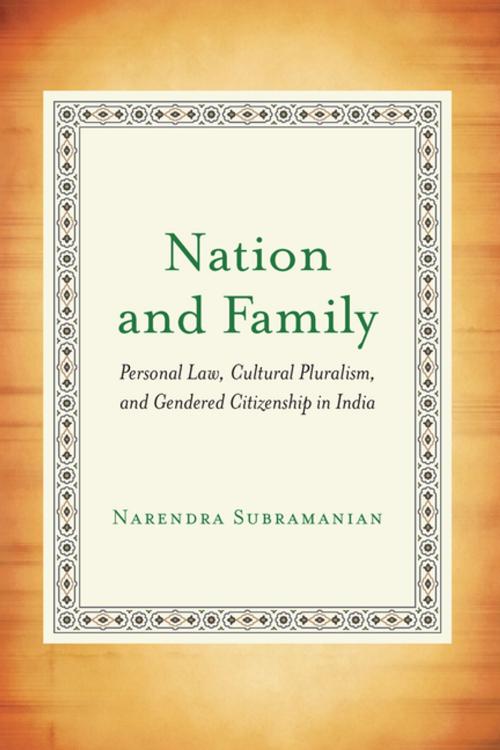Nation and Family
Personal Law, Cultural Pluralism, and Gendered Citizenship in India
Nonfiction, Reference & Language, Law, Gender & the Law, Comparative, Social & Cultural Studies, Political Science| Author: | Narendra Subramanian | ISBN: | 9780804790901 |
| Publisher: | Stanford University Press | Publication: | April 9, 2014 |
| Imprint: | Stanford University Press | Language: | English |
| Author: | Narendra Subramanian |
| ISBN: | 9780804790901 |
| Publisher: | Stanford University Press |
| Publication: | April 9, 2014 |
| Imprint: | Stanford University Press |
| Language: | English |
The distinct personal laws that govern the major religious groups are a major aspect of Indian multiculturalism and secularism, and support specific gendered rights in family life. Nation and Family is the most comprehensive study to date of the public discourses, processes of social mobilization, legislation and case law that formed India's three major personal law systems, which govern Hindus, Muslims, and Christians. It for the first time systematically compares Indian experiences to those in a wide range of other countries that inherited personal laws specific to religious group, sect, or ethnic group. The book shows why India's postcolonial policy-makers changed the personal laws they inherited less than the rulers of Turkey and Tunisia, but far more than those of Algeria, Syria and Lebanon, and increased women's rights for the most part, contrary to the trend in Pakistan, Iran, Sudan and Nigeria since the 1970s. Subramanian demonstrates that discourses of community and features of state-society relations shape the course of personal law. Ruling elites' discourses about the nation, its cultural groups and its traditions interact with the state-society relations that regimes inherit and the projects of regimes to change their relations with society. These interactions influence the pattern of multiculturalism, the place of religion in public policy and public life, and the forms of regulation of family life. The book shows how the greater engagement of political elites with initiatives among the Hindu majority and the predominant place they gave Hindu motifs in discourses about the nation shaped Indian multiculturalism and secularism, contrary to current understandings. In exploring the significant role of communitarian discourses in shaping state-society relations and public policy, it takes "state-in-society" approaches to comparative politics, political sociology, and legal studies in new directions.
The distinct personal laws that govern the major religious groups are a major aspect of Indian multiculturalism and secularism, and support specific gendered rights in family life. Nation and Family is the most comprehensive study to date of the public discourses, processes of social mobilization, legislation and case law that formed India's three major personal law systems, which govern Hindus, Muslims, and Christians. It for the first time systematically compares Indian experiences to those in a wide range of other countries that inherited personal laws specific to religious group, sect, or ethnic group. The book shows why India's postcolonial policy-makers changed the personal laws they inherited less than the rulers of Turkey and Tunisia, but far more than those of Algeria, Syria and Lebanon, and increased women's rights for the most part, contrary to the trend in Pakistan, Iran, Sudan and Nigeria since the 1970s. Subramanian demonstrates that discourses of community and features of state-society relations shape the course of personal law. Ruling elites' discourses about the nation, its cultural groups and its traditions interact with the state-society relations that regimes inherit and the projects of regimes to change their relations with society. These interactions influence the pattern of multiculturalism, the place of religion in public policy and public life, and the forms of regulation of family life. The book shows how the greater engagement of political elites with initiatives among the Hindu majority and the predominant place they gave Hindu motifs in discourses about the nation shaped Indian multiculturalism and secularism, contrary to current understandings. In exploring the significant role of communitarian discourses in shaping state-society relations and public policy, it takes "state-in-society" approaches to comparative politics, political sociology, and legal studies in new directions.















